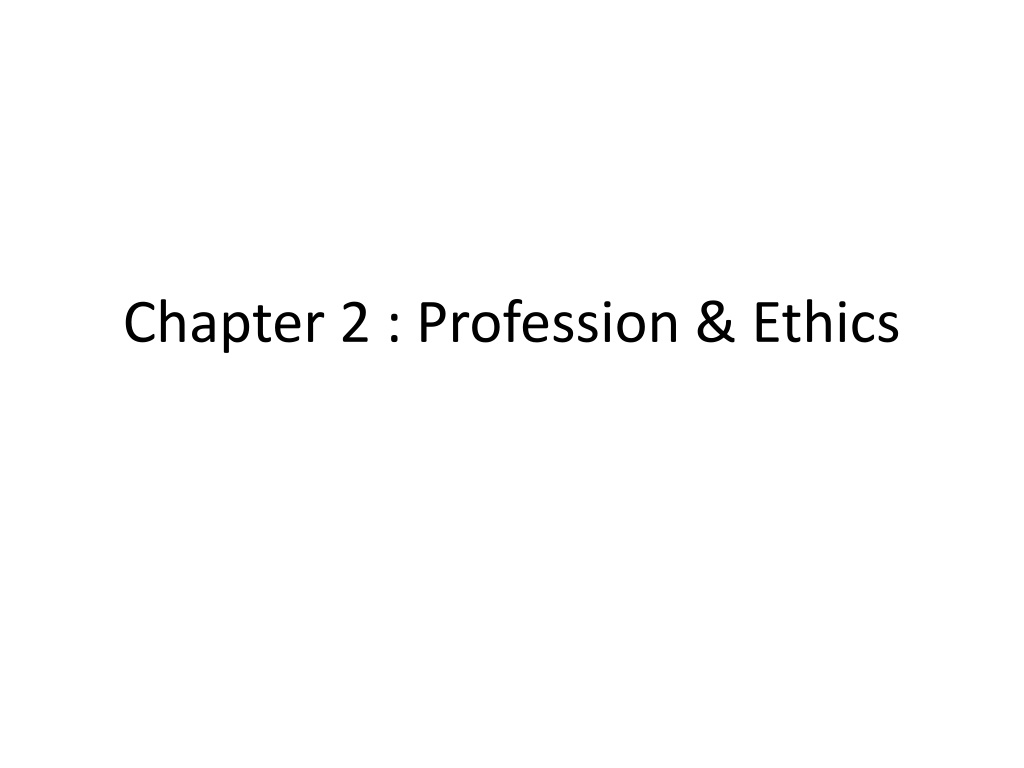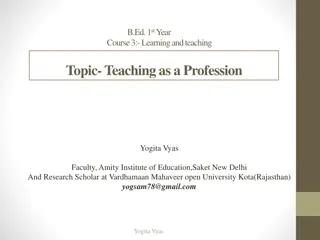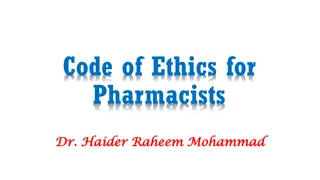
Understanding Profession & Ethics: Characteristics and Importance
Learn about the definition and characteristics of a profession, the significance of professionalism, the impact of ethics on professions, and the importance of engineering ethics in today's society.
Download Presentation

Please find below an Image/Link to download the presentation.
The content on the website is provided AS IS for your information and personal use only. It may not be sold, licensed, or shared on other websites without obtaining consent from the author. Download presentation by click this link. If you encounter any issues during the download, it is possible that the publisher has removed the file from their server.
E N D
Presentation Transcript
Profession : Definition & Characteristics A profession is defined as having a systematic knowledge acquired through specialized training or education and practicing the same as an occupation. Besides these, professionals bear morals and ethical behaviors. The content of profession with moral and ethical behaviors is professionalism.
A professional helps in providing specialized work of service to the societies. The following are some of the features of a profession : 1. A professional acquires a systematic knowledge and enhance skill. 2. A professional exercises the knowledge and enhance skill ethically as an expert, occupational or professional. 3. The service or works as an expertise of a professional is evaluated by the public. 4. Professionals follow code of conducts to keep moral of the profession high. 5. Professionals have their own cultures
Today, professions are found loosing professionalism due to following cause: 1. Inadequate salary. 2. Defective social norms or value. 3. Low moral of the individual. 4. Non-regularities of law and regulations. 5. Lack of political commitment.
Engineering morals, ethics and professionalism Ethics is generally concerned with rules or guidelines for morals and/or socially approved conduct. Ethical standards generally apply to conduct that can or does have a substantial effect on people s lives.
Why Engineering Ethics ??? Studying Engineering Ethics can achieve at least four desirable outcomes: a) increased ethical sensitivity; b) increased knowledge of relevant standards of conduct; c) improved ethical judgment; and d) improved ethical will-power (i.e., a greater ability to act ethically when one wants to).
Some Definitions Etiquette Laws Morals Ethics
Etiquette rules of acceptable personal behavior and courtesy e.g. proper dress, answering the phone, language, talking about others Laws a system of rules and punishments clearly defined e.g. legal driving age
Morals personal rules of right and wrong behavior e.g. derived from a person s upbringing, religious beliefs Ethics a code or system of rules defining moral behavior for a particular society
Behavior of a Professional Engineer Professional Engineers Code of Ethics Paraphrasing: Engineers do not lie, cheat or steal and always have safety in mind.
Case A Case Study: Murder Legal? Moral? Ethical? Good Etiquette?
Case A Case Study: Murder Legal? Moral? Ethical? Good Etiquette? Answers: Illegal Immoral Unethical Bad etiquette!
Case B Case Study: Driving over the speed limit when you are late for class Legal? Moral? Ethical? Good Etiquette?
Case B Case Study: Driving over the speed limit when you are late for class Legal? Moral? Ethical? Good Etiquette? Answers: Illegal Moral to some, immoral to others Unethical Bad etiquette if it effects other drivers
Case C Case Study: Driving over the speed limit when you are having a baby. Legal? Moral? Ethical? Good Etiquette?
Case C Case Study: Driving over the speed limit when you are having a baby. Legal? Moral? Ethical? Good Etiquette? Answers: Illegal Moral Ethical Etiquette does not apply
Engineering ethics Ethical responsibility...involves more than leading a decent, honest, truthful life. . . . And it involves something much more than making wise choices when such choices suddenly, unexpectedly present themselves. Our moral obligations must . . . include a willingness to engage others in the difficult work of defining the crucial choices that confront technological society
Examples of Engineering Codes of Ethics Accreditation Board for Engineering and Technology (ABET) National Society of Professional Engineers (NSPE) Institute of Electrical and Electronic Engineers (IEEE) American Society of Mechanical Engineers (ASME)
ABET (Accreditation Board for Engineering and Technology) Code of Ethics The Fundamental Principles Engineers uphold and advance the integrity, honor, and dignity of the engineering profession by: I. using their knowledge and skill for the enhancement of human welfare; II. being honest and impartial, and serving with fidelity the public, their employers, and their clients; III. striving to increase the competence and prestige of the engineering profession; and, IV. supporting the professional and technical societies of their disciplines.
ABET Code of Ethics of Engineers The Fundamental Canons 1. Engineers shall hold paramount the safety, health, and welfare of the public in the performance of their professional duties. 2. Engineers shall perform services only in the areas of their competence. 3. Engineers shall issue public statements only in an objective and truthful manner. 4. Engineers shall act in professional matters for each employer or client as faithful agents or trustees, and shall avoid conflicts of interest. 5. Engineers shall build their professional reputation on the merit of their services and shall not compete unfairly with others. 6. Engineers shall act in such a manner as to uphold and enhance the honor, integrity, and dignity of the profession. 7. Engineers shall continue their professional development throughout their careers and shall provide opportunities for the professional development of those engineers under their supervision.
Law vs. Ethics LAW Creates rules to guide conduct Balances competing values Punishes conduct that is illegal through formal structures ETHICS Offers guidance on conduct Addresses situations in which competing values clash Incentives and disincentives may be created by group (formal or informal)
Is legal the same as ethical? NO: YES: Law does not address all ethical dilemmas Legal duties may not meet standard of ethical conduct Beyond Compliance approach: fulfill legally recognized duties, but don t stop there. Law defines duties, rights, allowable conduct. Compliance approach to business ethics: fulfill legally recognized duties, and don t go further. In case of conflicts, it s generally held that legal standards must give way to ethical standards
Consider This: You and Al Case 1 You are the manager for Big-Mart, a large discount retailer. You recently fired Al, a sales clerk, after Al punched a customer during a dispute in the store (Al admitted this after the customer complained). Sue, manager of your competitor, Mega-Mart, calls you to tell you that Al has applied for a job at Mega-Mart, and to ask you whether Al is good with customers. WHAT DO YOU DO?
An ethical dilemma? Choice to be made Implicates competing values, rights, & goals Potential harm to decision maker? Potential harm to others? Ripple effect: long-term, far reaching implications of decision to be made.
How to Resolve Ethical Dilemmas Identify relevant facts Identify relevant issue(s) Identify primary stakeholders Identify possible solutions Evaluate each possible solution Compare and assess consequences Decide on solution Take action
How to Evaluate Solutions : Some Theories 1. Eternal law of ethics. 2. Utilitarian law of ethics. 3. Universalism law of ethics. 4. Distributive justice law of ethics. 5. Personal liberty law of ethics.
Eternal law of ethics. The eternal law of moral is the set of standards of goods behaviors based on the nature and the scriptures. By studying the nature and scriptures, common sets of moral standards are set. The set of morals standards should be obvious to anyone who takes time to study the nature of scriptures. Everyone should act in accordance with the common set of standards. These laws are general rules or principles. Do onto others as you would have others do onto you is an example.
Utilitarian law of ethics The professional or individuals should act in the way to creating the greatest benefits for the largest numbers of people. It sit based upon the outcomes or results of the act. This law of ethics arose from the teleology theory. In Greek, teleo means outcome or result. So a person should be aware of his or her act for its results or outcomes.
Universalism law of ethics This law of ethics is based upon the motive or intent of the doers. It states that the professionals must have good motives behind their doings. This law comes from Deontological theory , wherein Doen in Greek means duties and obligations. A professional as an engineer, has duties and obligations towards the societies they live in.
Distributive justice law of ethics Law based upon the primacy of justice equal to all. Rules and laws apply to all people. The professionals must have back in the mind that the law applies equally to all. The outgrowth of equality today is the result of this law.
Personal liberty law of ethics This law of ethics is based upon the personal liberty. This law states that any act which violates anybody s personal liberty even if the act creates greater benefits for the larger number of people is not accepted. Any action of professional or individual must not violates anybody s liberty at all.
Legal vs. Ethical: You and Al Legal Illegal Ethical? Al admitted to punching a customer. [You contact another store, X-Mart, to warn about Al] He is great with customers. Unethical? No comment
The Preamble Purpose is to safeguard life, health, and property, to promote the public welfare, and to maintain a high standard of integrity and practice.
Obligation to Society Broad context of responsibility 1. While performing services, the engineer s foremost responsibility is to the public welfare 2. Engineers shall approve only those designs that safeguard the life, health, welfare, and property of the public while conforming to accepted engineering standards Whistle blowing 3. If an engineer s professional judgment is overruled resulting in danger to the life, health, welfare, or property of the public, the engineer shall notify his/her employer or client and any appropriate authority
Obligation to Society Truth in duties 4. Engineers shall be objective and truthful in professional reports, statements, or testimonies and shall provide all pertinent supporting information relating to such items 5. Engineers shall not express a professional opinion publicly unless it is based upon knowledge of the facts and a competent evaluation of the subject matter The Duty of Full Disclosure 6. Engineers shall not express professional opinion on subject matters for which they are motivated or paid, unless they explicitly identify the parties on whose behalf they are expressing the opinion and reveal the parties interest in the matters
Obligation to Society Clean Hands Rule 7. Engineers shall not enter business ventures or permit their names or their firm s names to be used by any persons or firm which is engaging in dishonest, fraudulent, or illegal business practice Final Obligation to Society 8. Engineers who have knowledge of possible violation of any of the rules listed in this and the following two parts shall provide pertinent information and assist the state board in reaching final determination of the possible violation
Engineers Obligation to Employers and Clients Professional competence Engineers shall not undertake technical assignments for which they are not qualified Engineers shall approve or seal only those plans or designs that deal with subjects in which they are competent and which have been prepared under their direct control and supervision
Engineers Obligation to Employers and Clients The Validity of Approvals Engineers may coordinate an entire project provided that each design component is signed or sealed by the engineer responsible for that design component
Engineers Obligation to Employers and Clients Confidentiality Requirement Engineers shall not reveal professional information without the employer s or client s prior consent except as authorized or required by law
Engineers Obligation to Employers and Clients Conflict of Interest 1. Engineers shall not solicit or accept direct or indirect considerations, financial or otherwise, from contractors, their agents, or other parties while performing work for employers or clients 2. Engineers shall disclose to their employers or clients potential conflicts of interest or any other circumstances that could influence or appear to influence their professional judgment or their service quality
Engineers Obligation to Employers and Clients Full Disclosure An engineer shall not accept financial or other compensation from more than one party for services rendered on one project unless the details are fully disclosed and agreed by all parties
Engineers Obligation to Employers and Clients Government Conflicts of Interest To avoid conflicts of interest, engineers shall not solicit or accept a professional contract from a governmental body on which a principal or officer of their firm serves as a member. An engineer who is a principal or employee of a private firm and who serves as a member of a governmental body shall not participate in decisions relating to the professional services solicited or provided by the firm to the governmental body
Engineers Obligations to Fellow Engineers Obligation to Potential Employers Engineers shall not misrepresent or permit misrepresentation of their or any of their associate s academic or professional qualifications. They shall not misrepresent their level of responsibility or the complexity of prior assignments. Pertinent facts relating to employers, employees, associates, joint ventures, or past accomplishments shall not be misrepresented when soliciting employment or business
Engineers Obligations to Fellow Engineers Conflicts of Interest Engineers shall not directly or indirectly give, solicit, or receive any gift or commission, or other valuable consideration, in order to obtain work, and shall not make contribution to any political body with intent of influencing the award of contract by governmental body
Engineers Obligations to Fellow Engineers Reputations of Other Engineers 1. Engineers shall not attempt to injure, maliciously or falsely, directly or indirectly, the professional reputations, prospects, practice or employment of other engineers, nor indiscriminately criticize the work of other engineers 2. Criticize cautiously and objectively with respect to the person s professional status
Engineers Obligations to Fellow Engineers Contract Law Mutual agreement between two or more parties to engage in transaction which provides benefits to each of them 1. Mutual consent 2. Offer and acceptance 3. Consideration
Engineering Ethics and Legal Issues Other Contract Issues 1. Legally enforceable agreement requires a definite promise by each party to do something specific 2. Some benefit received that each did not have before 3. Does not have to be in writing to be valid
Engineering Ethics and Legal Issues Breach of Contract An actual violation of the terms in the contract must occur 1. Items not supplied, supplied but of substandard quality, or not supplied until long after a deadline 2. Party required to provide an equivalent value previously offered 3. Inability to fulfill contract is under ethical and legal imperative to do everything possible to provide equivalent value to other party
Engineering Ethics and Legal Issues The Letter vs. Spirit of the Law Read between the lines in terms of the intent of those documents as understood by those who formulated them
ASME Code of Ethics ASME : American Society of Mechanical Engineers ASME has set code of Ethics for Engineers:






















